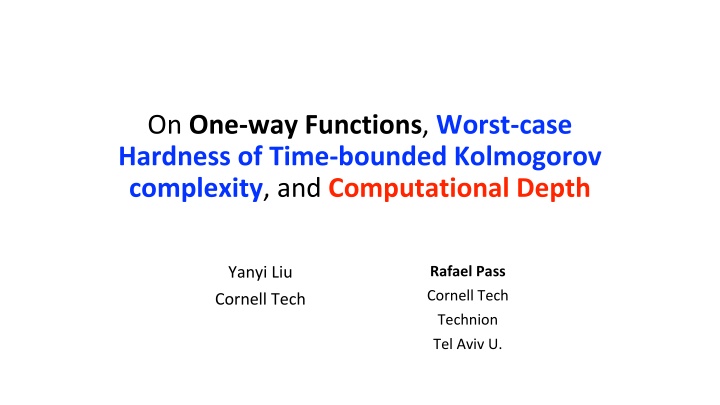
One-way Functions and Worst-case Hardness in Complexity Theory
Delve into the world of one-way functions (OWF) and explore their significance in computational complexity theory. Discover how OWFs are intertwined with worst-case hardness and time-bounded Kolmogorov complexity, shedding light on the challenges and implications they present in modern cryptography.
Download Presentation

Please find below an Image/Link to download the presentation.
The content on the website is provided AS IS for your information and personal use only. It may not be sold, licensed, or shared on other websites without obtaining consent from the author. If you encounter any issues during the download, it is possible that the publisher has removed the file from their server.
You are allowed to download the files provided on this website for personal or commercial use, subject to the condition that they are used lawfully. All files are the property of their respective owners.
The content on the website is provided AS IS for your information and personal use only. It may not be sold, licensed, or shared on other websites without obtaining consent from the author.
E N D
Presentation Transcript
On One-way Functions, Worst-case Hardness of Time-bounded Kolmogorov complexity, and Computational Depth Rafael Pass Cornell Tech Technion Tel Aviv U. Yanyi Liu Cornell Tech
One-way Functions (OWF) [Diffie-Hellman76] A function f that is Easy to compute: can be computed in poly time Hard to invert: no PPT can invert it OWF both necessary [IL 89] and sufficient for: Private-key encryption [GM84,HILL99] Pseudorandom generators [Shamir 83,BM 82,Yao 82,GL89,HILL99] Digital signatures [Rompel90] Authentication schemes [FS90] Pseudorandom functions [GGM84] Commitment schemes [Naor90] Coin-tossing [Blum 84] Not included: public-key encryption [RSA83], OT [Rabin81], obfuscation [BGI+01]
Holy grail [DH76] Can we base OWF on the worst-case hardness of NP? (Observation: OWF => NP BPP)
Towards OWF from Worst-case Hardness of NP Positive Results: OWF (and more) from worst-case hardness of lattices [Ajt 96, AD 97, Reg 04, ..] But all those problems are in ?? ????[GG 00], and thus unlikely to be NP-complete (unless the PH collapses) [BHZ 87] Negative results: Lots of (partial) black-box barriers, indicating that OWF can only be based on the worst-case hardness of problems in ?? ????, [Bra 79],[BT 03], [AGGM 06],[P 07],[MX 10] OWF from the worst-case hardness of ?? ?????
Today Thm 1 [informal]: OWF equivalent to the worst-case hardness of . Thm 2 [informal]: Under standard assumptions, ?? ???? = natural variant of standard time-bound Kolmogorov complexity problem Also: if we change the threshold in Pi, the same problem characterizes OWF, quasi-poly OWFs, or sub exponential OWFs..
Theorem [LP20] For every polynomial t(n)>1.1n: OWFs exist iff t-bounded Kolmogorov-complexity is mildly hard-on-average w.r.t the uniform distribution. Today: OWFs from worst-case hardness of Kolmogorov Complexity
Kolmogorov Complexity [Sol64,Kol65,Cha69] Which of the following strings is more random : 1231231231231231231 1730544459347394037 K(x) = length of the shortest program that outputs x Kt(x) = length of the shortest program that outputs x within time t(|x|) Can Kt be efficiently computed when t is a polynomial? Studied in the Soviet Union since 60s [Kol 65,T 84] Independently by Hartmanis [83], Sipser [83], Ko [86] Closely related to MCSP (Minimum Circuit Size Problem) [T 84,KC 00] Perebor conjecture: No better algorithm than brute-force!
The Minimum Kt Problem (MKtP) MKtP[s]: Given x {0,1}n, decide whether YES: Kt(x) <= s(n) NO: Kt(x) >= n - 1 Long standing open problem whether NP-complete: Lots of recent progress [Ila 20, ILO 20, Ila 21, LP 22, Hir 22, Ila 23] Also some barriers [MP 24] (w.r.t Levin-NP completeness, assuming iO)
Small Computational Depth Computational Depth [Antunes-Fortnow 09] CDt(x) = Kt(x) - K(x) Computational Shallowness: Q = {x {0, 1}n : CDt(x) <= 10 log n} Computational depth is a measure of unnaturally . Random strings are computationally shallow Computationally hard to find non-shallow instances [Hir 23,Ben 88] (assuming derandomization assumptions) [AF 09]: worst-case to errorless average-case reduction when restricting to Q! (Already known without Q for MKtP [Hir 18])
Comp Shallow MKtP: MKtP[s]|Q: Given x {0,1}n, decide whether YES: Kt(x) <= s(n), x Q NO: Kt(x) >= n - 1, x Q The problem that we will consider: In essence, MKtP[s] conditioned on natural instances Hardness of MKtP[s]|Qmeans that any decider must fail to decide MKtP[s] on a computationally shallow (i.e., natural) instance.
Main Theorem: A OWF-Complete Problem The following are equivalent for every t(n)>1.1n, ? > 0: 1. OWFs exist. 2. MKtP[n - 2]|Q ioBPP. 3. MKtP[ n?]|Q ioBPP. Remarks: 1. 2. 3. Uses non-black box techniques: we also prove a fully BB separation! But still extends to the non-uniform setting. Also characterizes quasi/subexp OWFs: by switching to a smaller threshold (and considering local compression of Kt) (a la [LP 22])
Main Theorem: A OWF-Complete Problem The following are equivalent for every t(n)>1.1n, ? > 0: 1. OWFs exist. 2. MKtP[n - 2]|Q ioBPP. 3. MKtP[ n?]|Q ioBPP. THM: Under the Rudich s Conjecture and standard derandomization assumption, for all sufficiently large t(n): MKtP[n - 2]|Q coAM
Main Theorem: A OWF-Complete Problem The following are equivalent for every t(n)>1.1n, ? > 0: 1. OWFs exist. 2. MKtP[n - 2]|Q ioBPP. 3. MKtP[ n?]|Q ioBPP. Concurrent and independent work [HN 23]: Also presents a worst-case characterization of OWF: Different problem, but using a related notion of computational depth Other differences: only characterizes ioOWF (as opposed to OWFs), not proven in the non-uniform setting.
The Key-idea in a Nut-Shell Thm: MKtP[n - 2]|Q ioBPP => OWFs. By [LP 20], average-case hardness of MKtP[n - 2] over uniform implies OWFs. In other words, any OWF inverter can be used to solve MKtP[n - 2] while failing only on 2n/n4 instances Argue: All those instance must have small Kolmogorov complexity < n- log n, once we consider a particular A (which later can be used to show large CD) - Fix some A, randomness of R such that R succeeds with the best probability - Since there at most there are at most 2n/n4 instances, they can be encoded using log (2n/n4) bits = n - 4 log n - Need log n extra bits to encode n, and O(1) to write the program that decodes.
today [LP 20] NP OWF MKtP|Q MKtP mild-HoA Hard for BPP Hard for BPP First OWF-complete problem; same problem but different thresholds <=> subexp OWF Believed to be outside of coAM, so could plausibly be NP-complete too! (indeed, a closely related problem McKtP is NP-complete [LP 22]) Inherently using non-black-box techniques Basing OWF on NP BPP is equivalent to proving a MKtP|Q is NP-complete Thank you!






















